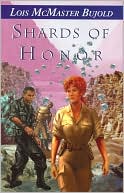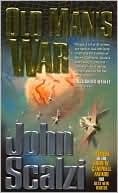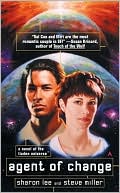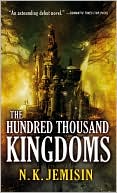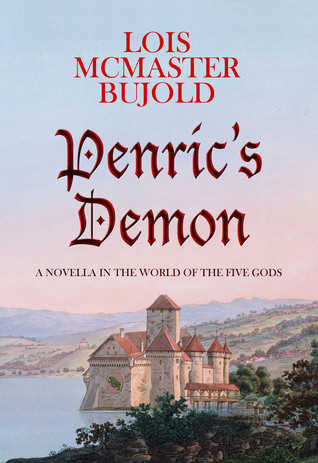 Format read: ebook purchased from Amazon
Format read: ebook purchased from AmazonFormats available: ebook, audiobook
Genre: fantasy
Series: World of the Five Gods #3.5
Length: 109 pages
Publisher: Spectrum Literary Agency
Date Released: July 9, 2015
Purchasing Info: Author’s Website, Publisher’s Website, Goodreads, Amazon, Barnes & Noble, Book Depository
On his way to his betrothal, young Lord Penric comes upon a riding accident with an elderly lady on the ground, her maidservant and guardsmen distraught. As he approaches to help, he discovers that the lady is a Temple divine, servant to the five gods of this world. Her avowed god is The Bastard, “master of all disasters out of season”, and with her dying breath she bequeaths her mysterious powers to Penric. From that moment on, Penric’s life is irreversibly changed, and his life is in danger from those who envy or fear him.
My Review:
I read Bujold’s World of the Five Gods series back when the originally came out in the early years of the 21st century. And it’s making me feel old to realize that was 15 years ago. As the saying goes, “Time flies like an arrow. Fruit flies like a banana.”
Moving on.
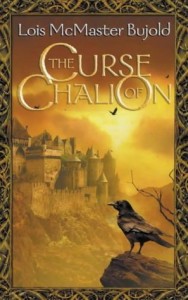 The World of the Five Gods series was originally called the Chalion series, after the first book in the series, The Curse of Chalion. The other books in the series are Paladin of Souls and The Hallowed Hunt. I’m not sure you need to have read the whole series to enjoy Penric’s Demon. I am certain that you don’t have to have read them recently to enjoy Penric’s Demon.
The World of the Five Gods series was originally called the Chalion series, after the first book in the series, The Curse of Chalion. The other books in the series are Paladin of Souls and The Hallowed Hunt. I’m not sure you need to have read the whole series to enjoy Penric’s Demon. I am certain that you don’t have to have read them recently to enjoy Penric’s Demon.
Which I very much did.
One of the building blocks of the series is the religious set up. There are five gods, and everyone pledges themselves to one or another, but that doesn’t mean that they don’t offer prayers to all of them at need. Most of the gods symbolize, among other things, one stage of a person’s life. Except for Lord Bastard, “the master of all disasters out of season.” He is the god of demons, of curses, of Murphy’s Law, and definitely of children born out of wedlock. He’s not evil. He feels more like a chaos agent, or an avatar of chaos, than anything specifically evil. He’s a trickster god, like Loki and Raven and Coyote and Anansi and Pan.
One of the other salient points about the Five Gods is that in this universe, they are REAL. It may be seldom that people meet their particular god, but it does happen more than often enough to prove that these are real agencies who really do exactly what their followers claim. The turning point in this story is when Penric faces Lord Bastard and has to choose his own fate.
The story, in Penric’s Demon, is the story of what happens to one young man when an agent of chaos, a demon, enters his life. Literally enters, as an elderly “priestess” of the Bastard passes her demon to poor Penric at the moment of her death.
It’s a setup. By the old lady, and undoubtedly by the Bastard himself. It’s also a test. But one of the things that becomes clear in the story is that the introduction of this little bit of chaos into Penric’s otherwise ordinary life is the best thing that has ever happened to him. If the dangers that it causes don’t kill him first.
It helps if the reader casts any Biblical notions of demon out of their head. Immediately. Because Penric’s demon, just like the Bastard himself, is not evil. In the story, she is much more like a Trill symbiont from Star Trek than anything else. The “demon” is an entity that shares consciousness with its rider or host, but has it’s own unique personality. In the case of Penric’s demon, it has 12 separate personalities, as each person who has hosted the demon has added a bit of themselves to its make-up.
For Pen it’s like having 10 sisters living inside his head. The other two personalities were animals, and they don’t talk much. But the collective consciousness that Pen names Desdemona has a life of its own, and it’s a life that has much more experience and wisdom than Pen could ever accumulate no matter how long he lives. Although, if he doesn’t figure things out quickly, it will be a very short life with a very violent end.
On the other hand, he will never have any true privacy again for the rest of his life. Unless he lets the Bastard’s priests remove the demon. He’ll be free and Desdemona will be taken back to her god and dispersed.
The story here is Penric coming of age, coming into his own, and deciding for himself whether the mess he has landed in through his own good intentions is one that he wants to stay in for the rest of his life.
Escape Rating A-: I loved this story, I only wish there was more of it. Or at least a certainty that Bujold will return to this world in the future. I remember liking this place and its people, and this little dessert of a story has only reinforced that memory.
I think this might be a good introduction to the World of the Five Gods. It’s a very small story, focusing on one young man and his dilemma. The series as a whole had a big sweeping arc with a lot of interesting politics. I remember loving it, but it was also quite meaty. This novella is a tasty little mouthful that will give new readers a terrific introduction to the style and setting of the series.
Also the series tended to focus on one person’s life and the way it changed, as viewed through the political lens of the whole. The story in Penric’s Demon is also the story of one person’s life and the way it changes. Just not so big on the politics. And that’s just fine for a story of this length.
One of the fun things about this story is that Penric is a very likeable character. He finds himself in this dilemma because he begins with the best of intentions, and that’s the way he goes on. He’s also relatively young, but still an adult, and while he has been settled into the life his family expects, it is pretty clear that it is NOT what he wants for himself. The demon is every bit as much his opportunity to chart his own course as it is the demon’s best chance of not just staying alive, but of having a companion she finds congenial. It’s very much a win-win story.


